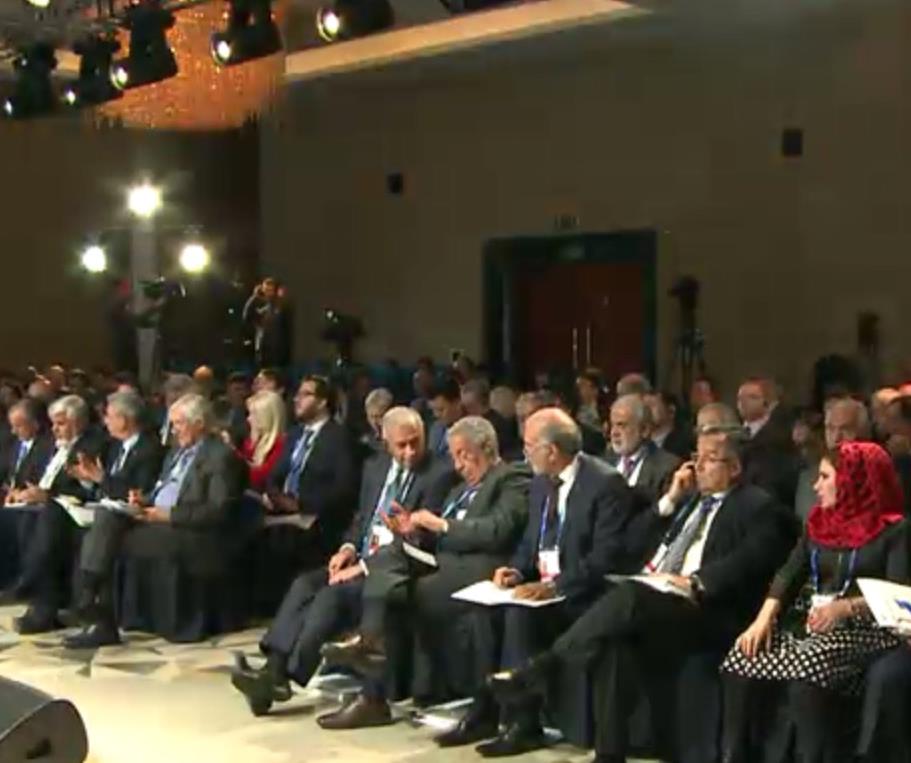 Prominent experts and high-level officials from Russia and all around the world have been trying to find the answer to the question: “The Middle East: When will tomorrow come?”
Prominent experts and high-level officials from Russia and all around the world have been trying to find the answer to the question: “The Middle East: When will tomorrow come?”
Russia’s annual Valdai Discussion Club — a prominent, marathon-like two-day dialogue on the Middle East — has just finished. The meeting, held in Moscow, united top officials and experts from Russia and all over the world, with vivid discussions on the burning issues involving the Middle East.
The Valdai format has once again proved to be an open platform for the free sharing of ideas, views and concerns. And what is more important is that it has proved that Iranians and Saudis, Palestinians and Israelis, and Turks and Kurds can be present in one hall, despite different religious beliefs, political views and affiliations. It shows they are able to talk, listen to each other, speak, peacefully argue, find common ground — and even joke and laugh.
The key topics on the table were Syria and Iraq, Yemen and Libya, the Arab-Israeli conflict, Iran and its place in regional affairs, and separately the issue of the Saudi-Iranian confrontation. They are the key issues that are forming the general regional environment and which have a serious impact on the global agenda and stability.
All these topics were approached from both regional and global perspectives, thus involving global players from the US, Russia, EU and even India and China.
The dialogue revealed several major characteristics of the current historical momentum.
First of all, we are living in a critical moment in history, with the emergence of a new world, the true nature of which is still not clear. Russia’s role in regional affairs is evolving, and is being re-evaluated with more constructive analysis, understanding and sane criticism, instead of a reaction of panic and fear.
Raghida Dergham — the founder and executive chairman of the Beirut Institute, columnist and New York bureau chief at Al-Hayat, and whose columns appear in Arab News — talked about the importance of Russia-US cooperation for the region. She also raised Iran’s role and ambitions in the region, notably in Syria.
Under the pressure of severe challenges the region is facing, there are signs of an attempt to put aside existing differences and make steps toward cooperation, facing up to the threats, and building the future the region hopes for.
At least that is what was clearly heard in the speeches of Amr Moussa, former secretary-general of the Arab League, Nabil Fahmy, former Egyptian foreign minister, and Ebtesam Al-Ketbi, founder and president of the Emirates Policy Center.
Fahmy has assumed that the majority of the regional challenges cannot be faced without the participation of the global players. But he cautioned that this participation and assistance should be constructive, not deepening the schisms with geopolitical games.
A reconciliation in a region facing major threats could be led by Egypt, traditionally taking the cornerstone role of stabilizing player, despite the severe internal crisis it is still going though following the shock of two revolutions in three years.
This call for regional reconciliation and cooperation is coming primarily from societies that are tired of confrontation and conflict.
Even the guests from Iran pointed out that there is a strong growing middle class in Iran, which is looking forward to modernization and a reconsideration of the policies toward the region and global players. Thus Iranian speakers gave hope for a change of Iranian policies in the foreseeable future. People are looking for peace, not for confrontation.
The last panel in the conference was entitled “The Future of the Middle East: In search of a common dream.” Politically the dreams of the governments are dividing, not uniting the sides. And from this perspective future prospects are quite gloomy, as long as the aspiration for dominance and power that prevails in politics continues, leading to more wars and confrontation. The dream of one government often eliminates the dream of another.
John Bell, director of the Middle East and Mediterranean Program at the Toledo International Center for Peace in Madrid, said we appear to be in a situation where there are a lot of dreams, but an absence of positive reality; some governments are manipulating Middle Eastern societies. But these same societies, political manipulation aside, are united by the same dreams of peace and prosperity.
This brings a crucial need for the emergence of civil societies that are able to form and determine the policies of governments. And the key to this lies in education, including training to resist propaganda and manipulation and teach critical thinking.
Thus, it is only through the perspective of such societies that the Middle East has a chance to pursue the common dream of peace. Governments stay and governments go. It is time to build bridges between the people.
Article published in Arab News
http://www.arabnews.com/node/1061826












